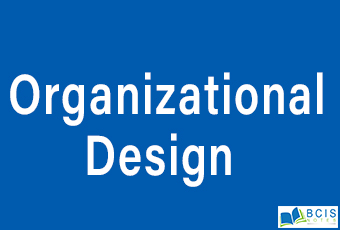
Organizational Design
The term design refers to the structure and form by which an organization operates. To organize and control, management must design an organizational architecture that makes the best use of resources to produce the goods and customers want. Thus constitutes the building block of an organization. This architecture is the combination of the organizational structure, control system, culture, and human resource management system that determines how efficiently and effectively organizational resources are used.
The two building blocks of organizational design are differentiation (allocation of people to tasks) and integration (coordination between people or functions or divisions). Vertical differentiation is related to the distribution of decision-making. Horizontal differentiation is concerned with the distribution of functions. It is a means of dividing a large and complex organization into smaller, flexible administrative units. it is the organization-wide division of work into various manageable units or departments.
In another way, we can describe the organizational design as:-
Organizational Design is the process of designing, defining or adapting the organizational structure. It usually tries to answer:
- Who is responsible for each activity
- Who has the authority
- What are the limits of this authority
- Who reports to whom (if you still believe that)
- Who has control which resources
- How information flows in the organization
The organizational structure usually has explicit elements such as an organizational chart, roles, job descriptions, chains of command, a board of directors, processes, policies, and so on. But it also has implicit or intangible aspects, such as the network of personal relationships and the informal flow of information.
You may also like Job Design

Leave a Reply